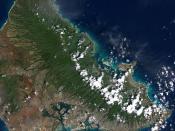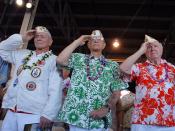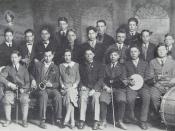There is various reasons for the bombing of Pearl Harbour by Japanese forces. The Japanese had had a trade embargo placed upon them after their continual aggression in the China and south-east Asian region in their race for more land and resources. They felt that this left them with two options either continue South in the hope of securing more land and risk war with America or accept the US demands of retreat. Japan decided to attack the U.S. first in the hopes of prolonging their ability to be able to fight in the war and thus decided to destroy Pearl harbour the major U.S. naval base in the pacific. The Japanese had both political and strategic reasons those political reasons included reaffirming pride in the Japanese navy and the showcasing of the ÃÂweakÃÂ western society. Strategically Japan hoped that by attacking Pearl Harbour they would be able to prolong American entry into the war and establish a strong hold in the pacific islands.
The ultimate aim of the surprise attack on Pearl Harbour on 7th December 1941 was to delay U.S. entry into the war for two years by destroying their naval force in the pacific. During this attack on Pearl harbour Japan aimed to destroy their oil reserves, destroy their aircraft carriers, their submarines and destroyer ships. JapanÃÂs estimate that they only had enough war resources for a war of two years if the supply blockade was not dropped meant that they hoped to conquer islands in the pacific, including the Dutch East Indies, which had vast oil supplies which the Japanese needed to support their war time efforts. This could only be achieved however by destroying the American naval base in this area and forcing the Americans back to the west coast. By keeping the Americans out of the war for two years the Japanese planned of having control of a vast area of the pacific and once the Americans were able to enter the war being able to maintain control and keep the Americans at bay.
Japanese citizens had lost much faith and pride in their navy and air force it was hoped that a success at Pearl Harbour using these would restore the pride in these forces which had not been felt since the defeat of Russia in 1904. After the strong land army forces strength in China in gaining Manchuria Japanese people began to disregard the navy as not being able to successfully meet the demands of the new war. By achieving a surprise attack on Pearl Harbour and destroying much of its naval force military leaders hoped that pride would be restored.
Japanese culture had been heavily influenced by western culture since trade was established with America and European nations in 1853. The leaders of Japan believed that this was unacceptable and aimed to reduce the strengthening impact by proving the superiority of the Japanese culture and life and highlighting the weaknesses of the west. By destroying the major world force in the pacific the Japanese military leaders hoped that they would be able to showcase the power in the dedication of the Japanese people through the example of the naval and air forces.
To achieve their tactical aims at Pearl Harbour the Japanese attack focused on destroying aircraft carriers, attacking the submarine base and oil reserves, destroying the pacific fleet, destroying the base to the extent that the Americans would have to move it to the west coast, achieving surprise, but not before a declaration of war was announced. Although many of these aims were achieved most were nullified as the Americans were able to quickly recover from the blow.
bibliographyohttp://www.historylearningsite.co.uk/pearl_harbour.htmoHTA text bookoConflict in the Pacific TextoKey Features Text bookohttp://plasma.nationalgeographic.com/pearlharbour/history/wwii_timeline.htmlohttp://ihr.org/jhr/v16/v16n6p-2_Martin.html



